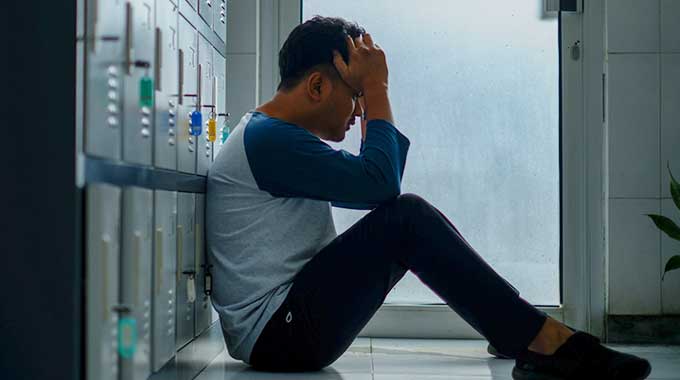Psychotherapy, also known as talk therapy, is a cornerstone treatment for depression. Extensive research has shown its effectiveness as both a stand-alone treatment and a complement to medication.
There are many different types of psychotherapy to choose from - the most suitable option may depend on each individual's needs. This blog offers more information about how each type of therapy can help treat depression.
What Is Depression?
Depression is a mental health condition characterized by periods of low mood. While it's normal to feel down from time to time, depression significantly impacts your daily life. There are lots of different types of depression, including major depressive disorder and bipolar depression.
Depression symptoms vary from person to person, and between different types of depression. One person's experience of depression may be very different from another's. However, there are some common symptoms of depression that people tend to experience, including:
- feelings of hopelessness or emptiness
- loss of ability to enjoy things
- loss of interest in hobbies
- loss of motivation
- fatigue
- insomnia
- weight loss or weight gain
Some people with severe depression experience suicidal thoughts and ideations and make suicide attempts. If you are worried that you or someone you know is thinking about suicide, you can contact the 988 Suicide & Crisis Lifeline for free and confidential support, 24/7.
How Can You Treat Depression?
Depression is one of the most common mental illnesses. According to the National Institute of Health, an estimated 21 million people in the US had at least one depressive episode in 2020. The good news is that depression is highly treatable and there are several evidence-based, effective treatment options available.
Treatment options include:
- Talk therapy (psychotherapy)
- Antidepressant medications
- Transcranial magnetic stimulation therapy
Each individual is unique and responds to treatment differently. Some people may receive both talk therapy and antidepressant medications, whereas others may participate only in psychotherapy. Antidepressant medication can have systematic side effects such as weight gain and sexual dysfunction, and it doesn't work for everyone. People with treatment-resistant depression, who don't respond well to medication, may try transcranial magnetic stimulation therapy, an innovative, FDA-approved treatment for major depression.
If you're living with depression, your practitioner or another mental health professional can help you determine the best treatment plan for you.
What Types of Therapy are Helpful with Depression?
There are lots of different types of talk therapy, and different options work best for different people. Some of these include:
- Cognitive-behavioral therapy (CBT)
- Dialectical-behavioral therapy (DBT)
- Interpersonal therapy (IPT)
- Psychoanalytic therapy
- Psychodynamic therapy
Cognitive-Behavioral Therapy
Cognitive-behavioral therapy helps you to identify thought and behavioral patterns that may underlie depressive symptoms, and change them into more positive ones. It focuses on the present, teaching coping strategies and other skills that can be applied to your daily life. It may support you to find ways to deal with major life stressors and help ease depression symptoms.
CBT is a short-term therapy and may require only twenty therapy sessions (although some people may benefit from a longer course). However, it doesn't usually address past experiences, so may not be sufficient for someone whose depression is rooted in early life adversity, trauma, or other experiences.
Cognitive-behavioral therapy is usually suitable for individuals who have mild to moderate depression, either by itself or with antidepressant medication. Extensive research has established CBT as an efficacious treatment for depression, with enduring effects that help prevent relapse.
Dialectical-Behavioral Therapy
Dialectical-behavioral therapy (DBT) is a type of CBT that focuses on the dual goals of change and acceptance. Initially developed for people living with Borderline Personality Disorder, DBT supports people to make positive changes while promoting self-acceptance. DBT is usually suitable for people who experience intense emotions or engage in impulsive behaviors.
Interpersonal Therapy
Interpersonal psychotherapy is a depression treatment that focuses on resolving interpersonal conflict and inadequate social support. It is based on the idea that difficult relationships with others can underlie psychological symptoms.
IPT usually lasts around sixteen sessions, and addresses four main areas:
- conflict in relationships
- life changes that affect someone's feelings about themselves and others
- grief and loss
- difficulties in forming or maintaining relationships
Like CBT, IPT focuses on the present rather than past issues. Therapists are supportive, optimistic, active, and share pathways for change.
Psychodynamic and Psychoanalytic Therapy
Psychoanalytic therapies aim to identify and work through childhood experiences and other events that may shape the way a person thinks today. They aim to bring to the surface unconscious thoughts and memories that influence mood and behavior. Together with the therapist, the individual can face these issues and begin to heal.
These therapies often draw on attachment theory - exploring how the way we are attached to our parents affects our relationships later in life. They may also use techniques like free association to uncover unconscious thoughts and patterns.
Most research on the effectiveness of psychoanalytic therapy covers psychodynamic therapy - a brief, short-term, and time-constrained type of psychoanalytic therapy. Studies have found that psychodynamic therapy is comparable in effectiveness to CBT. Research on long-term, psychoanalytic therapy is lacking, partly because it is difficult to conduct meaningful studies.
Transcranial Magnetic Stimulation Therapy
While talk therapy and antidepressants are often effective for treating depression, they don't work for everyone. Transcranial magnetic stimulation (TMS) therapy is an innovative and safe mental health treatment proven to effectively treat treatment-resistant depression.
TMS is a painless and non-invasive treatment that uses gentle magnetic waves to stimulate certain brain areas, leading to pronounced changes in mood and behavior. It does not require surgery and you stay conscious throughout the procedure. TMS comes with few side effects, the most common being temporary mild headaches and scalp discomfort.
Studies have shown that TMS has high success rates for treatment-resistant depression. A recent literature review found that response rates were around 50 - 55%. These figures are comparable to anti-depressant medications, but TMS avoids the systematic side effects of medication.

Depression Treatment at GIA Miami
GIA Miami is a pioneering mental wellness treatment center in downtown Miami. We combine cutting-edge neuroscientific research with compassionate care to provide each client with a transformative recovery experience. Our treatment programs are individualized from beginning to end to ensure you receive the best treatment for yourself.
At GIA Miami, our expert team includes leaders in the field of TMS therapy - our founder, Dr. Bonci, has pioneered several groundbreaking papers. When you join us, you have the chance to benefit personally from their extensive expertise, offering you the best chance of reaching your recovery goals.
We believe that everyone should have access to effective, up-to-date mental health treatments, and offer flexible programs to work around clients' needs. Our outpatient programs can fit around your daily schedule, and we offer telehealth services for those who cannot reach the center.
Contact Us Today
Living with mental illness is hard, but we're here to help. With our support, you can become the best version of yourself. Contact us today for a free consultation.

